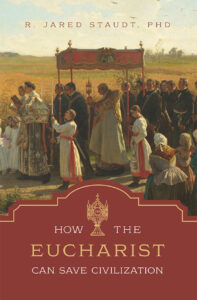For the Eucharist to shape our lives, we have to grow in receptivity to its grace. How we approach the sacrifice of the Mass impacts how much we get out of it. The more we focus our attention, unite our hearts to the sacrifice, and approach all the actions of the Mass with faith, the stronger the fruits that will arise from our prayer.
The Bible presents models of different ways of relating to Jesus’s sacrifice simply by looking to the foot of cross. First, we can see the negative reactions of some: the outright rejection of the Jewish leaders, the mockery of the Roman soldiers, and the indifference of so many who followed the crowds. On the other hand, we see the conversion of one soldier, who learned to see Jesus truly, recognizing him as “the Son of God.” The strongest models of love can be found in the repentant Saint Mary Magdalene, the faithful friendship of Saint John, and the shared sacrifice of Our Lady, who united herself most perfectly to Jesus in His suffering.
In the end, everyone has a choice, two paths that are exemplified by the two thieves. We can refuse the Lord’s mercy or confess our need for forgiveness, as Titian so beautifully depicts in the good thief’s reaching out toward Christ. Reflecting on these possible dispositions can help us to avoid falling into distraction and apathy and can urge us on to imitate the loving union of Jesus’s disciples. Like the thief, we can turn from our sin and seek the Savior’s mercy.
To foster a proper disposition for Mass, it is important to arrive early, which enables us to better remove distractions and thus achieve greater union with God. This preparation can even begin with added prayer the day before, as Saturday traditionally served as a day of preparation for the Lord’s Day. This spirit of readiness not only frees our Sunday but turns our attention toward the Mass.
On the day we attend Mass, it can also help to avoid those things that pull our minds and hearts away from giving ourselves completely to Christ in the Holy Eucharist, such as distracting entertainment. Taking extra time for prayer and avoiding things that turn our attention away from God increases our desire.
It is amazing what a stronger desire can do for making a more fruitful Communion. It builds up our anticipation and increases our eagerness to participate, leading to greater focus and love—putting Jesus before other things. This is true love, as Saint Maximus the Confessor explains: “Love for God is this: to choose Him rather than the world,” overcoming a love for self that remains stuck in the passions. Putting God first shows that we truly desire communion with Him and prioritize it over other things. This desire pleases God and disposes us to His movement in our souls.
Making a prayerful intention at each Mass can express our deliberate choice to receive Communion. This moment of prayer before Mass immediately breaks us out of a routine reception. A simple prayer can create greater openness to the grace of the sacrament, such as: “Lord, allow me to receive You this day. Help me to enter into communion with You today.”
A formal example of making an intention can be found in Saint Thomas Aquinas’s prayer before Holy Communion, which begins, “Almighty and Eternal God, behold I come to the sacrament of Your only-begotten Son, our Lord Jesus Christ. As one sick I come to the Physician of life; unclean, to the Fountain of mercy; blind, to the Light of eternal splendor; poor and needy to the Lord of heaven and earth.”
There are many other beautiful prayers written to help in the preparation to receive the Eucharist and to pray well at Mass, such as those written by Saint Ambrose and Venerable Fulton Sheen that are included in many prayer books (see appendix II). Many sacristies have a sign reminding priests how to approach the Mass: “Priest of Jesus Christ celebrate this Holy Mass as if it were your first Mass, your last Mass, your only Mass.” This same sentiment is important for the lay faithful to break us out of indifference and routine. Each time we receive Jesus, we receive an eternal gift, one not to be taken for granted.
This article is taken from a chapter in How the Eucharist Can Save Civilization by R. Jared Staudt, PhD, which is available from TAN Books.









